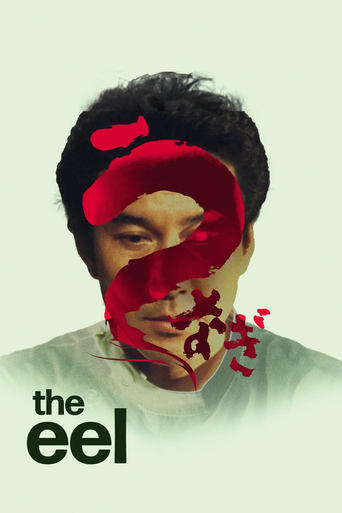Dennis Littrell
Takuro Yamashita, played very effectively by Koji Yakusho, gets an anonymous letter telling him that his young, pretty wife is entertaining another man while he is out fishing at night, this after she lovingly prepares and packs his supper. He goes fishing but returns home early in time to catch her in medias res. In a cold rage he knifes her to death. He bicycles to the police station and turns himself in. Eight years later he gets out of prison. This is where our story begins.Yamashita, now embittered toward others, especially women, is on parole. He sets up a barber shop in a small town. He keeps a pet eel because he feels that the eel "listens" to him when he talks. One day he discovers a woman (Keiko Hattari, played by the beautiful Misa Shimizu) in some nearby bushes who has taken an overdose in a suicide attempt. He brings the police to her and she is saved. She becomes his helper at the barber shop and is so efficient that the barber shop prospers. She falls in love with him but because of his shame and bitterness, he cannot return her love.This is a film about human sexuality. It is not pretty. The eel itself (a wet "snake") symbolizes sexuality. When this sexuality is confined it is under control. When it is let loose it is dark and deep and mysterious. Director Shohei Imamura's technique is plodding at times, and striking at others. His women are aggressive sexually even though they may look like little girls. His men can be brutal. Their emotions, confined by society as the eel is confined by its tank, sometimes burst out violently.For many viewers the pace of this film will be too slow, and for others the sexuality depicted will offend. For myself and others who are accustomed to seeing the faces of the players in long close ups on TV and in Western movies, Imamura's medium shots and disinclination to linger on the countenances of his actors will disappoint. Yakusho's face suggests the very depth and mystery that Imamura is aiming at, yet I don't think the camera lingers there enough. Also disappointing is how little we really see of Misa Shimizu's expressions. Chiho Terada, who plays the murdered wife, is also very pretty and completely convincing, but we see little of her. Her expression just before dying, a combination of shamelessness and resignation, funereal acceptance even, was unforgettable.This is very much worth seeing, but expect to be annoyed by the how slowly it unravels and by the central character's stubborn refusal to forgive both himself and his late wife and his inability to embrace the life that is now his.(Note: Over 500 of my movie reviews are now available in my book "Cut to the Chaise Lounge or I Can't Believe I Swallowed the Remote!" Get it at Amazon!)
MOONboy
I tried to spoil my girlfriend, who studies Japanese culture, with a film and it worked! Unagi (the Eal) tells a story of man who commits a 'crime passionelle' by murdering his wife. When he leaves prison the guards bring him 'his' eal. Under supervision of a local priest he tries to live a peaceful peasant-life in a place where nobody knows about his past; he becomes a barber, the eal is his friend ('they never say things you don't like..'). The situation changes when, on instigation of the priest, a girl starts assisting him in his shop. Inevitable his dilemma's come back...I loved this film for it reminded me much of the films of the Dutch director/producer Alex van Warmerdam; the ordinary, tightly directed up to every detail, the sufficating dilemma's lightly woven thru. Modern drama at it's best!
snaunton
This complex and beautiful film is built on correspondences and contrasts; between landscape and society, man and nature, between passive and active, death and life, sanity and madness, the repressed and the unbridled, sexuality and abstinence, comedy and tragedy, alienation and redemption. The many strands to these themes are woven together in a complex pattern that defies complete analysis. Yet 'The Eel' is well-paced and is easy to watch and enjoy.The film is set in Japan, that most self-disciplined and compliant of countries, and it is the limits, and limitations, of conformity and control that are explored. Behaviour is checked, emotions kept inward; yet when people look inward they find a seething that terrifies.The landscape here is a damp, featureless, washed-out coastland, exquisitely shot in a subdued palette that embodies the film's subject. The people, too, are generally quiet, gentle, good citizens. Yet violence and disturbance erupt into their lives as norms are broken: a woman makes love, intensely, exultantly, adulterously. Her husband discovers her and stabs her to death in the very act. After eight years in prison Yamashita is released on parole, alienated and withdrawn, and, accompanied by his eel companion, opens a barber's shop. He finds Keiko, unconscious after a suicide attempt, and she begins to work for him. She, too, is on conditional release, from her crazy mother and unpleasant extortionist boyfriend. There is an immediate sympathy between Yamashita and Keiko, a sympathy that he, especially, cannot bring himself to express, driven to repression and passivity by his guilt and fear.Each of these principal characters correspond with other characters in the film, providing a network of symmetry and contrast. Thus, Yamashita's failure to express his yearning for Keiko is set against Dojima's earlier lovemaking with her, and a fellow ex-convict's attempted rape. The ex-con haunts Yamashita, taunting him with his weaknesses, until he is transformed into a phantasm of Yamashita's imagination. Yamashita's wife's affair, too, finds resonance in Keiko's sensuality - and in both women's determination to provide a lunch box whenever Yamashita goes fishing. At the end, the man volunteers to assume paternity of Keiko's unborn child by Dojima.Attempts by minor characters in the film to reach out beyond febrile compliance and quietism provide humour but little comfort: Keiko's mother's Spanish dancing is but a manifestation of her madness, and Yamashita's friend seeks only the unattainable and absurd, in his obsession with contacting UFOs. The moments of irony and humour are generally introduced with a light touch, but the transition is less satisfactory in the climactic fight at the barber's shop. This crucial moment in the film, when Yamashita fights Dojima and his thugs, against her past and his, is filmed as slapstick; the humour in unnerving.In the end there is redemption, but the contrast of the conventional with the unruly is resolved, once more, quietly, almost submissively. Yamashita, his parole broken, returns to gaol for a year; Keiko waits for the birth of her child and Yamashita's release. Harmony is restored - on the surface. The eel, at last, is released.'The Eel' is a subtle and complex film, with a succession of images that require more than one viewing and more than this brief note to tease out. But doing so will be a rewarding experience. Imamura's film is strong and subtle, warm yet critical. It will reward many viewings.
gilli
This film deals with the theme of faith, its loss, its recovery. It has strong images, as usual in Imamura's films. It has also a well thought out plot development. But... it hints at directions that are never fully explored. There is a suggestion that the main character is insane. There are hallucinations. Keiko's behavior is also a little obscure at times. But as the core of the movie is melodrama, surreal aspects are only hinted at. That leaves a slight sensation of unachievement.

